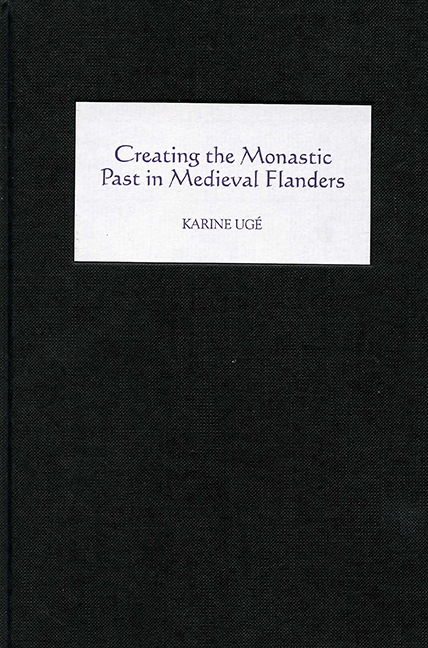Introduction
Published online by Cambridge University Press: 12 September 2017
Summary
This book examines the processes through which monastic communities created a usable past for themselves. The central issue is that communities did not produce historical narratives fortuitously, but rather that they did so under specific circumstances and that the writing of a text often served as a catalyst for the resolution of internal or external crises. This ‘utilitarian’ dimension of historiography implies that, in the course of events, communities kept adapting old accounts of their past in a way that fitted their present needs. To illustrate my subject, I have chosen to study historical narratives produced between the ninth and the eleventh centuries by the communities of Saint-Bertin at Saint-Omer and Saint-Rictrude atMarchiennes, both located in the southern part of the county of Flanders. I will first provide a brief overview of the geographical and historical context and then I will outline the theoretical framework on which the arguments of the book are based.
Saint-Bertin was founded in the middle of the seventh century by St Omer, bishop of Thérouanne, in the context of King Dagobert's efforts to assert his authority in Neustria. It soon grew into an important religious and economic centre in the region and can be counted among the most prestigious monasteries that were patronized by the Carolingian kings and, later, by the counts of Flanders. Marchiennes was founded around 640 by St Amand during his mission in the region of the river Scarpe; it was located on the Scarpe, a few miles away from Saint-Amand. The double monastery seems to have been fairly prosperous in the ninth century, but decayed during the tenth. It was restored in 1024 as a male Benedictine community by a disciple of reformer Richard of Saint-Vanne under the impetus of Count Baldwin IV and Bishop Gerard of Cambrai.
Both communities were located in the southern part of the county of Flanders. Flanders, considering its most extensive boundaries, consisted of the pagi of Waas, Aardenburg, Flanders, Yser, Ghent, Courtrai, Mempisc and Tournai to the north and to the east, and of Boulonais, Ternois (region of Thérouanne), Melantois (region of Lille), Pévèle, Ostrevant (region of Douai) and Artois (region of Arras) to the south. In terms of ecclesiastical organization the county encompassed the bishoprics of Thérouanne, Noyon-Tournai, and Cambrai-Arras: an important part of the archibishopric of Reims.
- Type
- Chapter
- Information
- Creating the Monastic Past in Medieval Flanders , pp. 1 - 16Publisher: Boydell & BrewerPrint publication year: 2005

